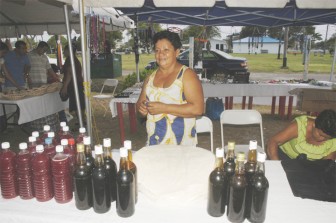Marjorie Rodrigues is a 50-year-old an Arawak woman born in the village of Santa Rosa at Moruka in Region One. Her entrepreneurial pursuits are steeped in the traditions of her people. Her business is, quite literally, a way of life.
The Arawaks are renowned for their farming tradition and Marjorie comes from a farming family. “Since I was a little girl, I know mom farming and making these things,” she said, gesturing at the bottles of thick, dark cassareep and the cassava bread which she brought to the city for display at the Amerindian Heritage Month Exhibition at the Sophia Exhibition Site.

By the standards of a community in which entrepreneurial pursuits are confined mostly to cottage industries and micro-enterprise pursuits, Marjorie runs a thriving business. She currently cultivates cassava on three of the 40 acres of family land. In better times she has cultivated up to 15 acres. These days she is concerned that increased acreage under cultivation brings with it greater responsibility; and the changing weather patterns bring their own uncertainties. However, she is looking forward to a time when she can increase her acreage under cultivation. Seven employees help manage her farming and production activities.
To make a living, Marjorie must make what, more often than not, is an arduous fortnightly journey by boat from Moruka to Georgetown. She travels from Moruka to Georgetown every fortnight to transport cassareep and cassava bread to her urban buyers, the Ministry of Amerindian Affairs and North West Organics.
Marketing her cassareep and cassava bread in Georgetown is her sole means of livelihood and if there are times when she is not up to the rigors of the trip from Moruka she has little choice.
On those days when she travels she must leave Moruka very early in the morning for a journey to Parika that takes several hours. The travel arrangements can be complex. She travels by passenger boat while her goods are transported on the cargo boat. At the Pomeroon landing, she takes a taxi to Georgetown with all of her cargo.
It’s impossible to ignore the hurdles the Marjorie must cross if she is to do business. The journey itself is fraught with risks and the costs associated with getting her goods to market means that the planning must be meticulous. Whenever she comes to the city to trade Marjorie must be mindful to purchase supplies of food and other necessities which can only be acquired in her village at considerably higher cost. Listening to her story one is compelled to reflect on the various ways in which the constraint of underdevelopment impacts on the country’s indigenous peoples.
While Marjorie is in Georgetown her 79-year-old mother Eugenia assumes the role of ‘director of operations,’ overseeing the farm and ensuring the sustained production of cassareep and cassava bread. A single parent, Marjorie has one daughter, a trained teacher currently attending the University of Guyana. Apart from her own immediate family, Marjorie’s earnings supports a niece who is studying in Georgetown.
She relies heavily on her relationships with her markets. North West Organics, an entity with which she has been doing business for more than 10 years, purchases her cassava biscuits and resells them to outlets both at home and overseas. The Ministry of Amerindian Affairs purchases more than 40 bottles of cassareep from her every fortnight. It is a modest amount but what she receives suffices to pay the bills.
Her’s is a modest operation that relies almost entirely on manual labour. Unable to meet even the modest demand for her products Marjorie has become a market for other more modest producers in her home. “I cannot make enough cassareep within the two-week period so I have to buy from my neighbours,” she said. There are times, too, when she must travel to other villages to buy cassava root.
Unpredictable weather patterns are currently making life difficult. Everything depends on the quality of the cassava crop and the quality of the cassava crop depends on the weather. More than that, the price of cassava is climbing. Business, Marjorie says, has known better times. One of her current preoccupations is with negotiating a higher price for her cassava biscuits. She keeps her fingers crossed since, she says, she is now hovering uncomfortably at what is now just about a ‘break even’ point. These days she finds herself having to purchase increasing quantities of cassava and in the absence of any real bargaining power on a market where the extent of the demand for her products is unclear she can only hope that the goodwill of her clients can bring her the modest price increases which she seeks.
Potentially, this is a peak season for Marjorie. The Heritage Month Exhibition and the upcoming GuyExpo provides an enhanced market opportunity for her enterprise. Whether or not she takes advantage of the opportunity; however, is by no means certain. Growth in her case is constrained by a number of factors including the vagaries of the weather and its impact on farm production, an enterprise that is labour intensive and low-yielding, high costs associated with transporting products to markets in the city and a lack of bargaining power associated with ill-defined demand for her products. Much of her trading still depends on patronage and Marjorie has been plying her trade long enough to understand that that is not the ideal way to do business.




